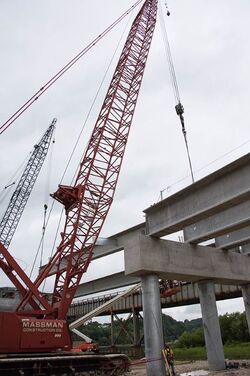Difference between revisions of "121.3 The Statewide Transportation Improvement Program (STIP)"
m (Per TP, STIP information and the annual process to update the STIP was updated to current practice.) |
m (Per TP, STIP information and the annual process to update the STIP were updated to current practice.) |
| (One intermediate revision by the same user not shown) | |
(No difference)
| |
Latest revision as of 10:59, 9 November 2020
The Statewide Transportation Improvement Program (STIP) sets forth the specific construction projects MoDOT will undertake in the next five years. The STIP is a rolling construction plan; as one year is completed, another year is added. It covers highways and bridges; transit, aviation, rail and waterways; bicycle and pedestrian; and operations and maintenance projects.
MoDOT, in accordance with state and federal law, annually prepares the STIP which includes all projects utilizing existing federal funds and state revenue. The STIP is fiscally constrained and provides accountability to taxpayers for the tax dollars spent. MoDOT fully programs available right of way and construction funds for the first three years of the STIP, while programming 50 percent or less of available funds in the fourth and fifth years of a STIP. Inflation is applied to projects programmed in the second, third, fourth and fifth years of the STIP.
MoDOT districts, Metropolitan Planning Organizations (MPOs) and Regional Planning Commissions (RPCs) determine which high priority projects should be funded through the Planning Framework for Transportation Decision-Making. The year-long involvement of planning partners, which includes MPOs and RPCs, public officials, special interest groups and citizens, culminates in a 30-day public comment period for the draft STIP. The document is publicized and made available to Missourians for review and comment. All comments receive an acknowledgement and are shared with district staff for consideration in the project development process and planning partners for consideration in ongoing Planning Framework project prioritization. Comments are summarized and shared with the Missouri Highways and Transportation Commission when the final STIP is presented for approval each July.
Once a transportation need has progressed through the needs prioritization process, the scoping process and the project prioritization process, the solution and associated project should be well defined that accurate costs and project delivery schedules can be forecast. Only projects that have been developed to this level of detail should include commitments of right of way or construction funds in the STIP. The District Engineer must support the addition of any project added to the right of way or construction component of the STIP. Transportation Planning Division must concur with any major projects or projects funded with statewide funds prior to the inclusion of any right of way or construction funds in the STIP.
Except for “preliminary engineering only” projects, STIP projects are commitments to the public that the described project will be delivered within the STIP time frame and budget. However, this commitment is limited to the category of funds included in the STIP. For example, a project that only has right of way funds does not indicate a commitment to construct the project, only that the right of way will be obtained in that time frame. MoDOT’s accountability to the public is measured by its ability to deliver the described project within the right of way and construction dollars included in the STIP as well as the planned fiscal year for the activities.
Some projects may require the programming of preliminary engineering funds only in the STIP for multiple years in order to allow the scoping process to be completed. Preliminary engineering funds should be included in the STIP prior to the first year that a project specific commitment of right of way and/or construction funds is required to be included. There must be a balance between the desire to produce the most accurate estimates possible and the requirements for producing the STIP.
For most projects, the minimum level of project development necessary to accurately identify the costs and delivery schedule occurs at the preliminary plans stage. For some projects, this minimum level of project development will be adequate to accurately predict right of way costs, construction costs and delivery schedule. Other more complex projects may require a greater level of development to achieve the desired level of accuracy.
Preliminary plan quantities and historic unit cost data are used to produce the STIP construction cost estimate. Refer to EPG 104.7 Estimates for additional information. Right of way estimates will be based on the tentative right of way lines identified in the preliminary plans and preliminary estimates of individual property values. At this point in the project development process any unusual conditions or costly items, such as major utility adjustments, how traffic will be handled during construction, any special working restrictions that may be placed on the contractor, incentive/disincentive clauses, contract acceleration clauses, environmental constraints, environmental mitigation commitments, etc., should also be identified and included in the project’s estimate.
The Transportation Planning Division’s Statewide Programming group coordinates the department’s efforts to gather all the information contained in the program and publish the STIP. On an annual basis, specific guidance is provided to the District Planning staff for STIP programming. Every annual update is unique and available funding and programming direction is to be obtained directly from Statewide Programming.
